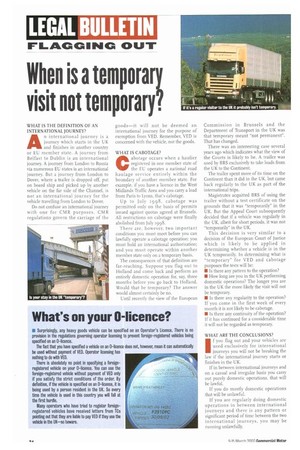When is a temporary visit not temporary?
Page 26

If you've noticed an error in this article please click here to report it so we can fix it.
WHAT 1S1 I IE DEFINITION OF AN INTERNATIONAL JOURNEY?
An international journey is a journey which starts in the UK and finishes in another country or EU member state. A journey from Belfast to Dublin is an international journey. A journey from London to Russia via numerous EU states is an international journey. But a journey from London to Dover, where a trailer is dropped off, put on board ship and picked up by another vehicle on the far side of the Channel. is not an international journey for the vehicle travelling from London to Dover.
Do not confuse an international journey with one for CMR purposes. CMR regulations govern the carriage of the goods—it will not be deemed an international journey for the purpose of exemption from VED. Remember, VED is concerned with the vehicle, not the goods.
WHAT IS CABOTAGE?
Cabotage occurs when a haulier registered in one member state of the EU operates a national road haulage service entirely within the boundary of another member state. For example, if you have a licence in the West Midlands Traffic Area and you carry a load from Paris to Lyons, that's cabotage.
Up to July 1998, cabotage was permitted only on the basis of permits issued against quotas agreed at Brussels. All restrictions on cabotage were finally abolished from July 1998.
There are, however, two important conditions you must meet before you can lawfully operate a cabotage operation: you must hold an international authorisation; and you must operate within another member state only on a temporary basis.
The consequences of that definition are far-reaching. Suppose you flag out to Holland and come back and perform an entirely domestic operation for, say, three months before you go back to Holland. Would that be temporary? The answer would almost certainly be no.
Until recently the view of the European Commission in Brussels and the Department of Transport in the UK was that temporary meant not permanent". That has changed.
There was an interesting case several years ago which indicates what the view of the Courts is likely to be. A trailer was used by BRS exclusively to take loads from the UK to the Continent.
The trailer spent more of its time on the Continent than it did in the UK, but came back regularly to the UK as part of the international trips.
Magistrates acquitted BRS of using the trailer without a test certificate on the grounds that it was "temporarily" in the UK. But the Appeal Court subsequently decided that if a vehicle was regularly in the UK, albeit for short periods, it was not "temporarily" in the UK.
This decision is very similar to a decision of the European Court of Justice which is likely to be applied in determining whether a vehicle is in the UK temporarily. In determining what is "temporary" for VED and cabotage purposes the tests will be:
• Is there any pattern to the operation?
• How long are you in the UK performing domestic operations? The longer you are in the UK the more likely the visit will not be temporary.
• Is there any regularity to the operation? If you come in the first week of every month it is not likely to be cabotage.
• Is there any continuity of the operation? If it has continued for a considerable time it will not be regarded as temporary.
WHAT ARE THE CONCLUSIONS?
If you flag out and your vehicles are used exclusively for international journeys you will not be breaking the law if the international journey starts or finishes in the UK.
If in between international journeys and on a casual and irregular basis you carry out purely domestic operations, that will be lawful.
If you do mostly domestic operations that will be unlawful.
If you are regularly doing domestic operations in between international journeys and there is any pattern or significant period of time between the two international journeys, you may be running unlawfully.








































































































